Contracts you should never sign
Table of Contents
When it comes to software engineering and the IT industry in general, contracts are a necessary part of doing business. Here and there, you sign NDAs — as an employee, contractor, or company — which nowadays are a necessary evil. I'm not a fan of confidentiality agreements, as companies usually include clauses that have no place to be there. So, the best thing we as engineers can do is be aware of the types of contracts we're signing. Even better, if we know the contracts that we should avoid signing. In this article, I'll share some of my experience with legal documents.
Before we jump into the article, disclaimer — not a lawyer, not legal advice.
Back in the day, I read an article by Joel Spolsky about the NDAs, and I agree with him 100% — companies did start abusing the NDAs/Non-Competes. Also, FTC has proposed to ban Non-Compete clauses in all employee contracts in 2023.
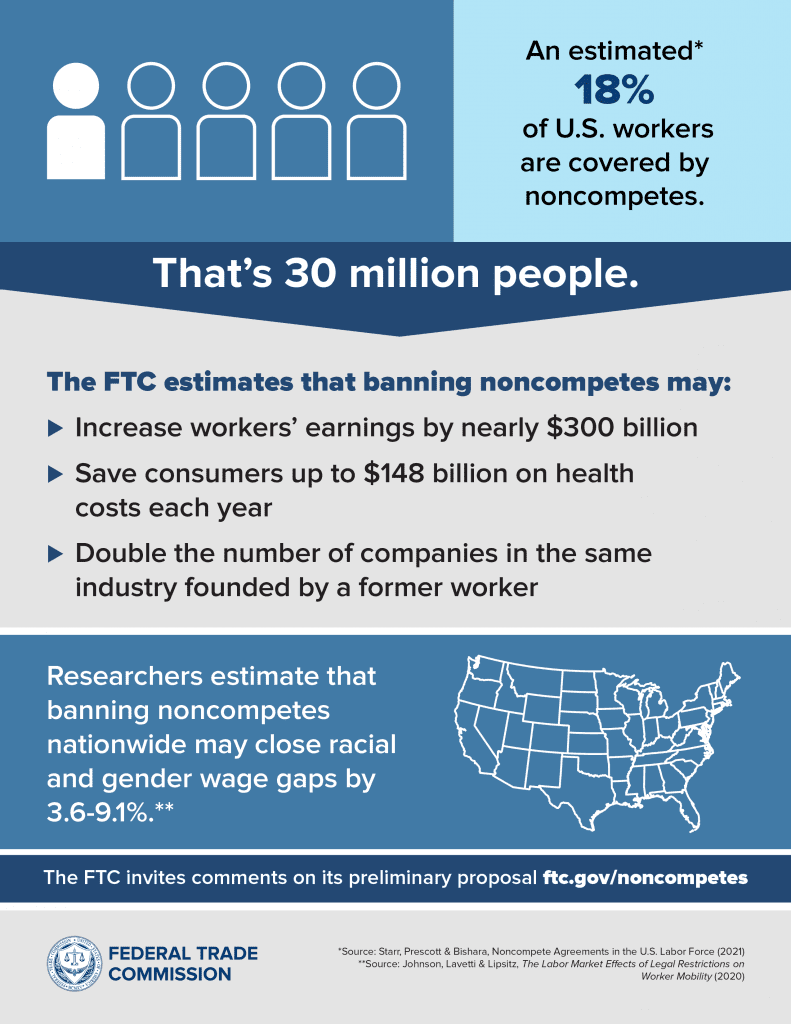
You need to keep your employees loyal by treating them well, not by creating arbitrary obstacles in their career.
Joel Spolsky
I also saw this tweet not long ago that reminded me that most engineers I know take contracts lightly. They trust and assume that, by default, the contract is already in their interest. Nobody is so evil that they would offer you to sign an agreement that is not beneficial for you, right?
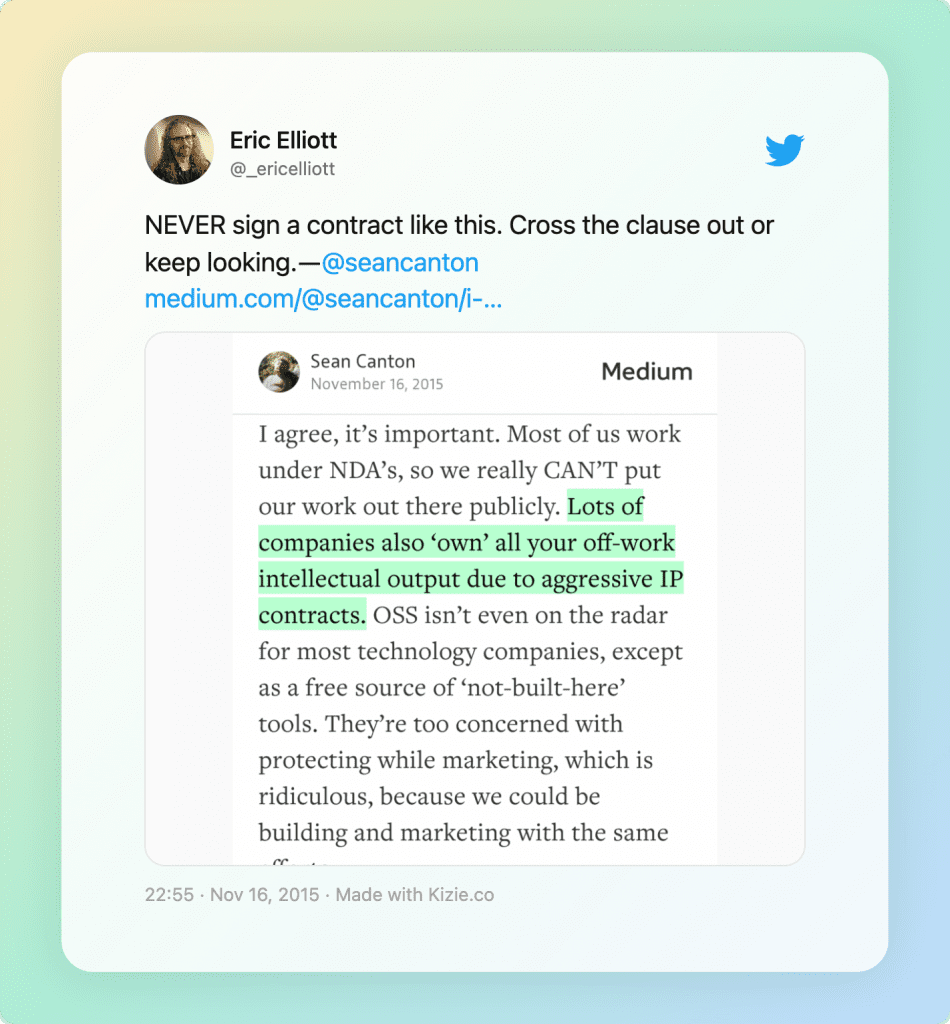
To be honest, I always assume good faith from people who offer me to sign some documents, but I still read through all of it and clarify every point that is unclear to me. This should be your default — trust but verify, and there's no shame in discussing parts of the contract. In the end, it's a bilateral agreement that should benefit all the parties. And if you miss anything or agree to some terms you did not clarify beforehand — it's on you.
The good news is that contracts are not set in stone, they are usually open to negotiation until they're signed, and even after signing, you have a chance to change something if you're on good terms with the counterparty.
Stuff you shouldn't sign
Any form of a non-compete clause in employee contracts. These clauses prohibit an individual from working for a competitor for a certain period after leaving a company. These are bullshit and are mostly illegal in their phrasing.
They look something like this:
Employee agrees, for a period of X months after resignation with Employer, not to work in the field of Y and/or in the region of Z.
I've seen contracts that prohibit a person from accepting opportunities in a radius of X km around a company's headquarters for 12 months. CRAZY. To be clear, there are other more effective ways to protect a company's IP or against solicitation from former employees — non-competes are just evil and help no one.
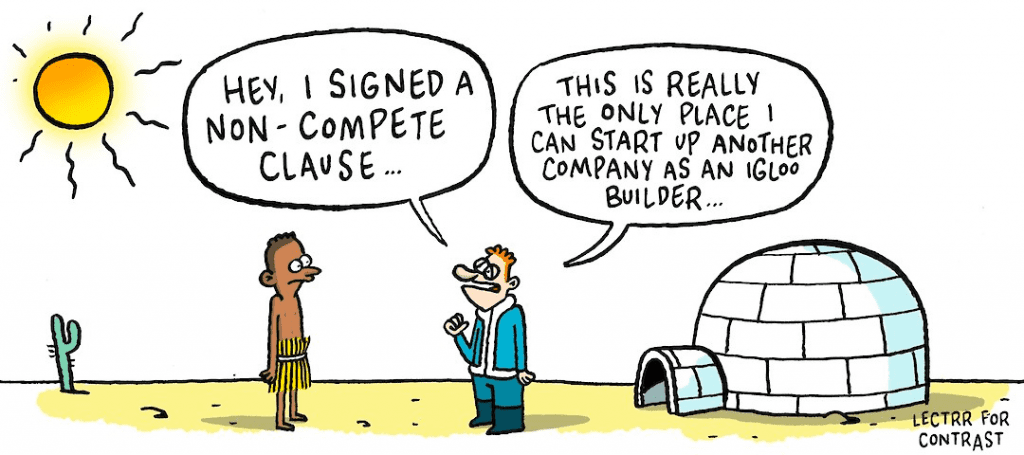
If you're an engineer and get offered a non-compete, turn it down. Plain and simple. Even with all the layoffs happening, there is still a shortage of skilled developers, so you're in demand, and you can always find a company that cares about keeping a good relationship with their employees instead of ruining their future potential (even if it is outside of their company).
Another clause to watch out for, but is not as dangerous as the non-compete, is the "I agree not to cause any other employees to get hired," which prohibits you from hiring directly or allowing any current employees to get hired by the company to which you went. This clause protects the company from the unlikely event of a manager leaving and taking their team with them.
Confidentiality agreements, a.k.a the Non-Disclosure Agreements. These must be carefully read through, and any broad language should be dismissed. Be wary of contracts that are overly strict about types of information that are allowed to be shared and that is not genuinely confidential. Most of them also don't have ANY expiration date, which is a big no-no.
There is, however, one clause I’ve seen in a lot of NDAs that I consider quite unacceptable. It is a clause that forbids you to hire anybody who works for the company that is making you sign the NDA. Presumably, they think that while you are visiting them, you will hire away all their employees and put them out of business.
- Joel Spolsky
If you really need to sign one — it needs to define precisely what is protected by the NDA. Contain no broad language, and contain an expiration date, the agreed penalties, and the jurisdiction.

Exclusive distribution agreements. This is relevant mainly for creators, but I know many developers create content, books, videos, etc. It sucks if you have an exclusive contract with Amazon that allows you to sell your product only on Amazon. Contracts that require one business to use the services of the other exclusively can limit future growth opportunities and should be avoided if possible. Not worth it.
A project-based agreement without a clear definition of scope and definition of done. If you’re a freelancer and a new one, you might consider keeping the contracts relaxed, e.g., “Develop an E-commerce shop.” This can go wrong in so many ways, as you and the Client have very different opinions on what an e-commerce shop should be able to do. Reviews? Recovering abandoned checkouts? BNPL Integrations?
💣 Any work contract should be explicit, never implicit.
A vague project agreement will come back and bite you. Contracts that do not clearly define the project’s scope can lead to disputes and, most of the time, DO lead to at least a mild headache. It's essential to have a clear and detailed scope of work that outlines the project’s deliverables, timelines, and milestones.
Clauses that you should avoid
Work-for-hire clauses a.k.a "Everything belongs to your employer": These clauses transfer ownership of any work created during the contract to the hiring party. Sounds straightforward and logical, except it means:
- Anything you do with the company property, e.g., work computer, automatically belongs to the company, even if you do it on the weekends.
- If you work for a software hub, any SaaS app you build over the weekend will belong to the company, regardless of whether you do it with company property or not — as it's related to the company's business.
- Belonging to the company means everything, not just the IP — the revenue, the code, and the good vibes.
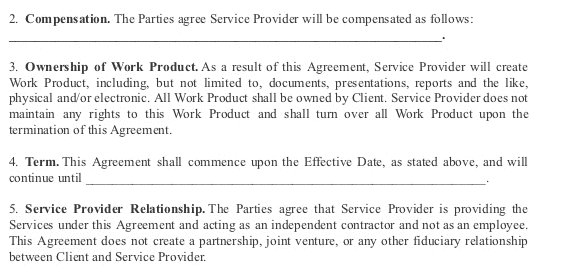
Ideally, before starting any side hustle — clear it up with your employer. Even if you think you're in the clear, it's highly recommended to have everything in writing where you're specifically granted an exemption from this clause. Most of the time, this clause is just a catch-all protection against the employee trying to claim copyright on something they built for the company, so it's very easy to get an exemption to this clause if you explain your case.
One-sided termination clauses: In general, you should avoid any one-sided clauses. Every clause should have a balance of what it takes from you and what it gives you. So if someone can terminate the contract without any explanation, and you don't have that right, that's a no-go.
Unclear compensation rules a.k.a “how to get fucked in startups”: So, if you watched the movie Social Network, there was this scene where Eduardo Severin’s Facebook shares got diluted from 34% to 0.03% because he signed some wrong documents. This is an oversimplification of what happened, but the sentiment holds that you should be very careful with the compensation clauses and shareholder agreements.
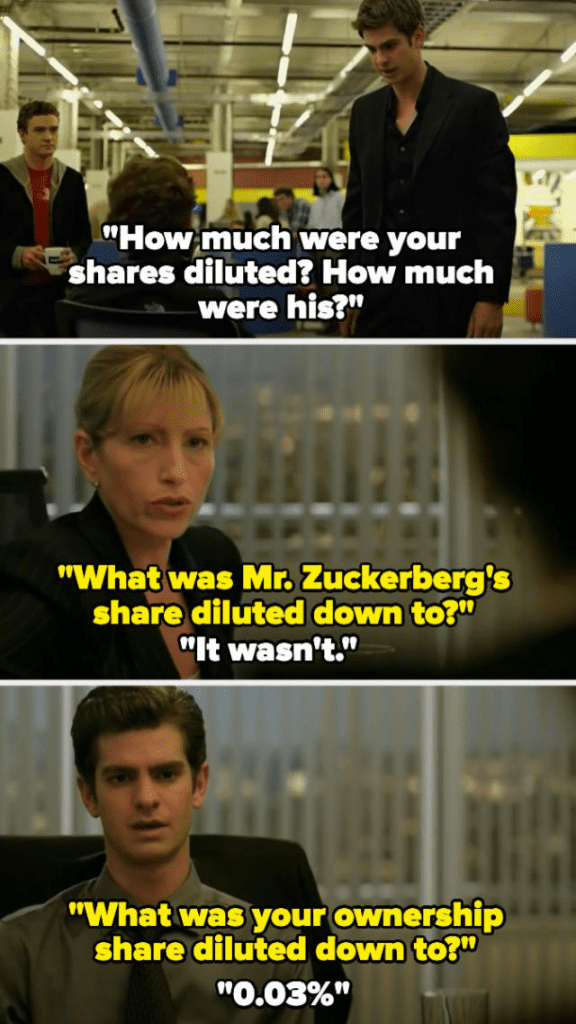
Red flags that you should keep an eye out for:
- Absence of vesting period. Vesting is the period you must wait before turning your options into shares. Also, to make this clear, options != shares, you will still need to buy those shares at the agreed-upon price. If you leave before you execute those options, you forfeit any benefits. Additionally, there should be some timeline for when you can start executing your options.
- No explicit termination clause. If your CEO can fire you on a whim — consider yourself expendable. Before you sign any sweat equity agreement, check that there are clear performance criteria described in the exit clause.
- No mention of Tag-Along and Drag-Along Rights in your shareholder agreement: Tag-along protects you as a minority shareholder, someone sells — you can sell at the same price also. The drag-along right protects the majority shareholder. If they sell, they can also force you to sell under the same conditions. You might be at a disadvantage if the contracts don’t have them.
Automatic renewal clauses, unless you really want them: Some contracts automatically renew for a fixed period unless the individual or company takes action to terminate the agreement. These can be difficult to get out of, so read the fine print. These are used, in my opinion, in a predatory way in the Fitness industry where you come in January, sign up for a yearly contract, and then it’s so hard to get out of that contract by the time that you remember that you need to cancel it, it’s already too late and the following year rolls over. Kudos to those who notify you a few weeks before the deadline.
🚷 Never sign anything you're not completely sure about.
TL;DR;
I think we can summarize it quite well with just a few bullet points:
- You should read your contracts and, better yet, get your lawyer friend to take a look at them. There's no shame in that.
- Everything can and should be negotiated. We are people, we have empathy, at least most of us do.
- You sign the contracts in good faith, propose clauses in good faith, and ensure it’s a win-win for everyone. If the other party is uninterested in a win-win, you walk away.
- Avoid Gym contracts.
Feel free to suggest anything from your experience in the comments.
Enjoyed the read? Join a growing community of more than 2,500 (🤯) future CTOs.
Other Newsletter Issues:
- Things they didn’t teach you about Software Engineering
- ⛓ Implementing Atomic Habits in IT
- Software Development is very subjective
Other Popular Articles:
-
Josh Smith
Hi there,
I have created Free Video for your website, if interested reply with just “Yes” and i will send it right away.
Cheers
Josh Smith -
Sky
After signing a bad contract early in my career, I now always take the time to read and understand every clause. Negotiating terms was intimidating at first, but I learned it’s about protecting my interests as much as the company’s. Clarifying project scope upfront has saved me from countless headaches and misunderstandings down the line.
-
Gigi
You know, when it comes to signing contracts, I always take my time to go through every detail. It’s crucial to understand what I’m agreeing to before putting pen to paper. Non-compete clauses? No thanks. I prefer contracts that benefit everyone involved – win-win all the way.
-
Ryan
In Germany you could change it to “Avoid all contracts”, not just gym contracts. I’ve never seen a country so in love with abusive contract termination clauses. Want to terminate your mobile phone contract? You can’t cancel on the expiration date. You must cancel a month before. Want to cancel your Deutsche Bahn discount card? You must cancel _six weeks_ before the expiration date, or you’re locked in for another year.
I’ve heard from some Germans that the way they deal with this is that immediately after signing a long-term contract, they cancel it. They figure the company will take pains to keep you when the year is up, whereas they’re certainly not going to remind you of your impending cancellation date.
-
Anonymous
I’d love to negociate, truly. But may large companies have a these contracts as templates with HR. It’s a sign it or leave it kind of situation. They aren’t going to spend money on their lawyers to build a custom contract just for you (most of the time).
-
Sia
Very true, big companies are very rigid in their contracts and they cannot afford / don’t want to customize it at all. Also, they never run out of candidates, so they have the upper hand in this.
-
Martin
No, I don’t agree with the “large companies cannot negotiate contracts”. This is an image that large companies want to portray so people don’t even approach them with change requests. As long as you are talking to a human you can ask for a change. Large companies have legal departments that can clarify quickly and don’t need to hire external lawyers.
I have worked with VERY large companies and they are totally used to negotiate contracts – it’s daily business and one of the main reasons to have a legal department: create contract templates and check non-standard language of negotiated contracts. A contract template is only the starting point.
How to do it: ask for the contract in editable format (e.g. Word), turn on “track changes”, make your changes and send it back “Kindly ask you to revise the contract as follows”. Of course, consult with a lawyer if it’s high risk and/or high value – they might find issues that you don’t see and propose a revised phrasing.
-
-
Tom W. U.
>Some contracts automatically renew for a fixed period unless the individual or company takes action to terminate the agreement.
You really got to review the process how many years in exact numbers…
Most have the “non-compete agreement”, it can be a hell hole, if working in a conglomerate workplace or research firm. Your basically stuck if your choice was to leave to make a LLC./-> Company.
Defiantly consider getting that lawyer friend or finding a free advice ones nearby. -
Wood
The author writes from the assumption that negotiation in hiring is between equals. Unless the individual has a truly unique or very, very few others possess the same skills, the company has the ultimate power: they can withdraw the offer. Chances are you individuals do not have multiple offers for employment but the company has multiple candidates they could hire for a role.
Nonetheless, I still support the underlying idea–negotiate upfront and continuously–but have realistic expectations based on the market conditions at the time. Great piece!
-
Martin
Of course contract negotiations are always a matter of who has more power. Don’t assume you have zero power because you are a new hire. It’s probably you main, if not the only source of income. Never hurts to ask for a change (or better than asking is to simply propose a change – you don’t want to come across as beggar, but a professional that knows what he’s doing). For an employment contract it’s probably worth to spend 500 bucks and hire a lawyer (specializing in employment matters) to have him look at your contract before you sign it. That’s what I did my last employment and lawyer found 2 or 3 issues including some in my favor (unenforceable terms).
-
-
Anna R.
> Before you sign any sweat equity agreement, check that there are clear performance criteria described in the exit clause.
This should be “sweet” not “sweat.”
-
Vinay
True! Agree with that.
-
-
Anonymous
Also watch out for “standard” contract closeout forms. As a subcontractor, it was standard to sign a closeout form at the end that verifies that all work has been invoiced and paid including totals; these forms are often required by the client to make sure the prime is not playing games with the subcontractor’s charges.
One prime contractor added additional clauses that made the subcontractor assume all liability for the project (even if the problem it wasn’t their fault), but gave the prime any subsequent payments or rebates (even if they belonged to the sub).
When we refused to sign we were told it was “standard” and every other sub signed it – then told we were required to sign it. They refused to accept an equitable version of the closeout form. [we got monthly demands for the form for about two years] -
bob
its like reading a bad poem. why did you format the article 1 word per line?
-
linus torvalds
you need to turn your browser zoom down, boomer.
-
-
Anonymous
Other things you should not sign. Music label deal, music publishing deal or any thing from a person in the music business or related industries.
-
red verona
In California where non-competes are mostly null and void I’ve seen companies get creative. One wanted me to agree to notify them of any changes in post-termination employment for 1 year and to authorize them to contact my new employer so my former one could scare the new ones about all the non-disclosure agreements I was under. When I pointed out how unreasonable it was they retracted the offer.
-
Hein
You might be willing to accept a non-compete if it is associated with large enough severance package. (For example, if they are willing to give you one month’s salary for every month of non-compete, then it seems like an alright deal. I would make sure that the severance pay required for the non-compete to be in effect even if you are fired for cause.)
-
D
In some places these IP agreements are not legal, so they’ve attempted to work around those limitations by using Inventions Agreements.
Also, some people don’t realize this, but the name the other party puts on the agreement is irrespective of the content of the agreement.
Part of reviewing the agreement is breaking down the elements, and determining the type of agreement. Its annoying as this is a lot of work and this company behavior only limits the labor pool which ends up costing them more for less due to basic market forces for dubious benefit. It may not seem that way, but the people who end up agreeing to exploitative agreements don’t engage, so there wouldn’t be anything to protect. This also kills or takes away the strong incentive for any employee to spend time or improve their professional skills off the clock.
Needless to say, a lot of places do this, and its simply wrong think, they are effectively eliminating unseen competitive benefits they receive from employees.
-
